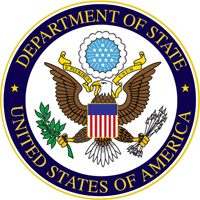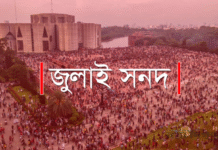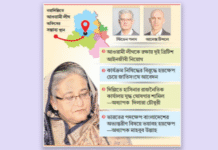
A file photo shows a rickshaw garage on the bank of the river Buriganga.
The government in its desperate bid decided on Wednesday to engage Bangladesh Navy to protect the rivers surrounding the Dhaka city from encroachers and check their pollution as well. The decision came at a special meeting of a high-powered taskforce, led by shipping minister Shajahan Khan, at the secretariat in the wake of its failure to check pollutions and reclaim the Buriganga, Turag, Balu and Shitalakkhya rivers from encroachers, said officials. The meeting decided to form a steering committee, to be led by Bangladesh Navy chief, to coordinate and monitor drives by law enforcement agencies to reclaim all rivers surrounding the capital from grabbers and check their pollution, said senior information officer of the ministry Md Jahangir Alam Khan. Food minister Kamrul Islam, state minister for power Nasrul Hamid and chief of Naval Staff admiral Nizamuddin Ahmed, among others, were present in the meeting. The committee would coordinate drives by various agencies to protect the rivers from encroachers as well as from pollutions, said officials, who attended the meeting. The national taskforce, led by the shipping minister, has been working to protect the rivers from the grabbers and restore their navigability for last seven years. But every time, when the grabbers were evicted by law enforcement agencies and district administrations from areas along the rivers, they made a comeback once the drive was over. Representatives from law ministry, shipping ministry, industries ministry, environment ministry, land ministry, local government division, Bangladesh Navy, Border Guards Bangladesh, Coast Guard and city corporations, chairman of National River Protection Commission, WASA managing director, BIWTA chairman, additional inspector general of police (admin and operations) and deputy commissioners of Dhaka, Narayanganj, Gazipur and Munshiganj will be incorporated in the steering committee. At the meeting, Bangladesh Navy made a presentation on the present positions of the rivers and quality of their water along with a work plan to check pollutions caused by municipal and industrial wastes, according to the officials. The meeting was informed that 4,500 tonnes of city wastes and 22,00 litres of poisonous tannery wastes are channeled into the city rivers every day. At least 7,159 kilograms of industrial wastes were thrown into the river Turag at Tongi alone, according to a document presented at the meeting. Shajahan Khan, after a taskforce meeting last year, had said they did not have adequate manpower to evict all those who encroached on the rivers. He said most areas of the Old Buriganga channel had already been occupied by powerful quarters and it seemed quite impossible for them to reclaim the land of the whole channel. The national taskforce for ensuring navigability and normal flow of rivers earlier had ordered the district administrations to operate mobile courts under executive magistrates against encroachments on the rivers and river water pollutions across the country. The High Court in 2009 directed the government to take appropriate steps to stop encroachment, earth-filling, and construction of illegal structures on the Buriganga, Turag, Balu, and Shitalakkhya rivers.
Source: New Age









